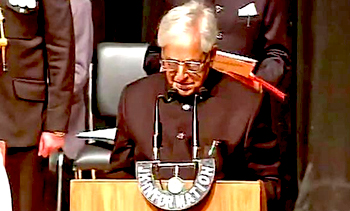Jammu, Mar 1: People's Democratic Party (PDP) patron Mufti Mohmmad Sayeed took oath as the chief minister of a PDP-BJP coalition government in Jammu and Kashmir on Sunday in the presence of Prime Minister Narendra Modi in Jammu's General Zorawar Singh Auditorium.

While Mufti would be chief minister for the entire six-year tenure, BJP's Nirmal Singh will be the deputy chief minister. The two parties are also going to share the post of the assembly speaker and legislative council chairperson.
A multi-tier security has been put in place for the swearing-in ceremony at General Zorawar Singh Auditorium of Jammu University. The venue has been made out of bounds for the public and sanitation operation with metal detectors and sniffer dogs have been launched.
A team of the Special Protection Group had reached Jammu well in advance for the function. Over 200 to 300 municipal workers have been deputed to clean various areas of the city, particularly areas in and around Jammu University.
The coalition agenda - the Common Minimum Programme (CMP) - will be unveiled after the swearing-in ceremony at a joint press conference.
Talks between the two parties had centered on areas where they ideologically disagreed: Article 370, which accords J-K a special status, and the controversial Armed Forces (Special Powers) Act that gives overriding powers to security forces.
Sayeed was keen on an alliance with the BJP after last year's assembly elections threw up a hung verdict. He made his intentions known by rejecting outright the unconditional offers of support from the Congress and the National Conference (NC).
Sayeed's close aides say he had a bitter past experience with the Congress and an alliance with the NC was out of question.
The former J-K chief minister who has the distinction of being the first and till now the only Muslim home minister of the country wanted an alliance with the BJP given that the saffron party had swept the Jammu region, winning 25 seats while majority of his party's 28 seats came from the Kashmir Valley.
Perhaps he wanted to respect that mandate. That is the reason why Sayeed has been repeatedly stating that the alliance with the BJP was to win hearts and minds of the people of the state.
"The PM has a vision and I have a dream of making J-K an island of peace," Sayeed said after a meeting with PM Modi on Friday in New Delhi.
The PDP-BJP coalition came after a fractured verdict in the assembly polls held last year. While PDP was the largest party with 28 seats in the 87-member House, the BJP had won 25. The NC bagged 15 and Congress 12. The Sajjad Lone-led People's Conference won 2 seats.
The firming of a power sharing alliance between two diametrically opposite ideologies - Sayeed called the alliance as coming together of North Pole and South Pole - was a tough task for leaders of both the parties.
It would be equally challenging for them to keep it going for a full six-year term.








Comments
Add new comment